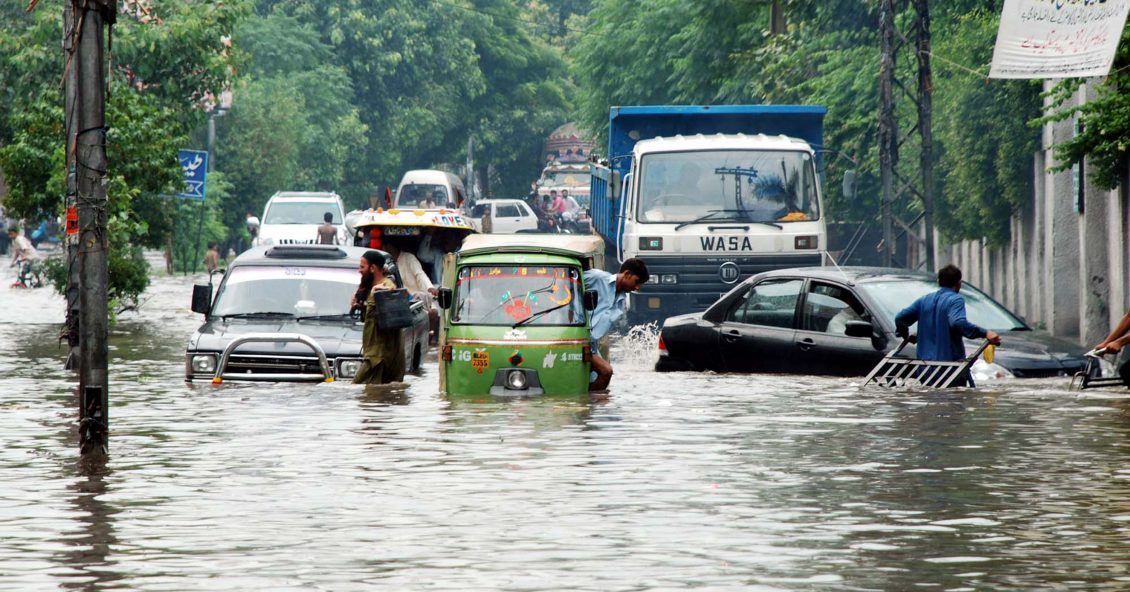Floods in Pakistan show importance of solidarity and climate action
23.09.22
Starting 14 June 2022 unprecedented rainfall inundated Pakistan–causing widespread flooding and landslides that have taken an enormous toll on human life, property and infrastructure.
More than 33 million people are affected, 1,480 people died and almost 12,800 have been injured. Over the past week alone, around 1,000 km of roads, 23 bridges, and more than 55,300 houses in Pakistan have been damaged or destroyed. In total, nearly 1.2 million houses have been hit and some 569,000 houses demolished. The federal government has classified the disaster as a ‘calamity hit’ in 81 of the country’s 160 districts, the first-tier of local government in the country. One district, Balochistan, has received 5.1 times its 30-year average rainfall as of 27 August, while another, Sindh, is drowning in 5.7 times its 30-year average.
In spite of this, the Pakistan Postal Service keeps providing essential services during this disaster. Over 1,500 posties and their families are directly affected themselves by the floods and have lost their homes or worse.
“Even though many of Pakistan’s postal workers are suffering from terrible personal losses and roughly one-third of the country is underwater, the post continues delivering, and it continues to connecting people and communities,” says Rajendra Acharya, Regional Secretary of UNI Asia & Pacific. “It shows that the post is essential—especially in a crisis. We stand with these workers who are incredibly important during this terrible time and will remain so as the country rebuilds, and our hearts are with their families and loved ones.”
UNI Global Union’s Post & Logistics sector represents over two-and-a-half million essential postal workers in 90 countries, including five postal trade unions in Pakistan. Cornelia Berger, Head of UNI Post & Logistics, said, “We express our deepest sympathy and solidarity with the 49,900 postal workers in Pakistan. These floods—the most deadly in the country’s history—not only show the post’s value but also the urgency of climate action.”
A report compiled by the World Weather Attribution (WWA) group, comprised of preeminent climate scientists, links the devastating floods to climate change. Models show that a climate 2°C warmer than in preindustrial times, caused by human action, will likely increase the likelihood of intense rainfall and other extreme weather events.
The massive destruction in Pakistan is the latest example of why national and international decision makers and governments must take responsibility—and action—to secure an alternative future.
UNI Post & Logistics identifies climate change as one of the biggest risks for postal workers. On one hand, postal workers are confronted with extreme weather and temperatures while providing regular services. On the other hand postal workers and the postal infrastructure are used in times of disasters for supporting the affected people and aiding organizations. And so, UNI Post & Logistics has developed a proposed green new deal for post to offer an alternative, CO2 neutral future. As a postal workers feel climate change on a daily basis, and UNI takes as its duty to fight climate change wherever and as fast as possible.
Additionally, for the past several years, UNI Post & Logistics has cooperated with the Universal Postal Union (UPU) to provide input on the UPU guidelines for risk management during natural disasters for postal companies. The main goal for UNI Post & Logistics is the protection and safety of workers. This also include workers receive training, equipment and preparation in case they need to provide services or support during natural disasters.
“Postal workers are on the frontline of disasters and should be able to carry out their duties as safely as possible,” sad UNI’s Berger. “But we also must demand that policy makers take the immediate steps to address the existential crisis that climate change presents. Workers, communities and countries cannot withstand these types of floods becoming the new normal.”
UNI Asia & Pacific


